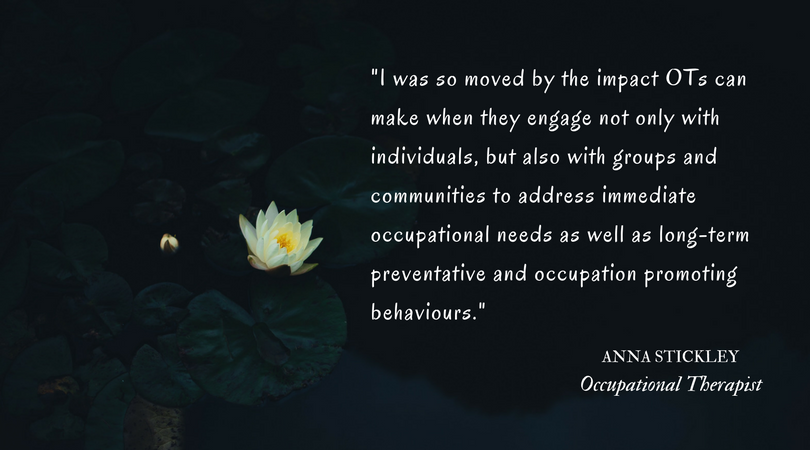After working as an OT in adult mental health for a number of years, I had the opportunity to manage a psychosocial project in Uganda. It had been one of my childhood dreams to live in a mud hut and do humanitarian work! (I still don’t know why)!
My experience in Uganda changed my perception of OT and what OTs can offer. I had the opportunity to design an create a psychosocial program focusing on the needs of children, their families and communities as a result of civil war. Even though this sounds like a huge challenge, I had a conviction that my OT training had prepared me well for it. I knew from my training and my own beliefs that it is so important to consider human beings holistically.
Back home in the UK and in the humanitarian sector in Uganda, so often people are put into “categories” or “problems” and a service only addresses part of the problem. I wanted to try to offer a holistic project, as much as possible. Next, I had the challenge of narrowing down how to address the multiple and complex psychological and social needs in the internally displaced community. Again from my OT training I knew that by listening to the person I am working with, truly understanding them and running with them in the direction they want to go, was the approach I needed to take. This meant putting aside my thoughts on what I thought should be done, so I and my team listened to the voices of the children, families and communities affected. We heard what they wanted to be able to do to be able to solve some of their own issues and challenges. Together, with the children, their families, various members of the community and my team came up with a project that addressed immediate physical, emotional, psychological and social needs through occupations and activities that were normal in their culture. As a team we all came up with long term sustainable strategies for dealing with the poverty that was the root of many of the psychosocial problems they faced.
It was only after my return to the UK that I discovered that the work we had done and the approach we had used was called ‘community-based rehabilitation’ (CBR). I was so moved by the impact OTs can make when they engage not only with individuals, but also with groups and communities to address immediate occupational needs as well as long-term preventative and occupation promoting behaviours. My realisation of this led me to discover that a similar approach was being developed in the UK through organisations called social enterprises. I discovered that through social enterprises in the UK, OT’s could work truly collaboratively with the individuals and communities they are working in, to contribute to solving a social problem. This then led me to engage in a PhD to research OT practice in social enterprises in the UK, which I am doing now at the University of Northampton. My study has made me realise that there are various types of social enterprises ranging from community owned initiatives, to NHS “spin-offs” which are completely different! The phrase “social enterprise” has become a really political term because of the Government’s plans to out-source the NHS. However, I am determined not to lose sight of the fact that OT’s can be a part of creating social change through genuine collaboration with those we work with, to design and create the type of organisations we want to run to deliver the type of OT that we know we were trained to do. I’ve met some really inspiring OT’s who have taken the plunge and set up their own social enterprises and it’s great to see them functioning to their full potential, using all their OT skills and not having to fit into a box of a medical category or a service. Anna.Stickley@northampton.ac.uk


